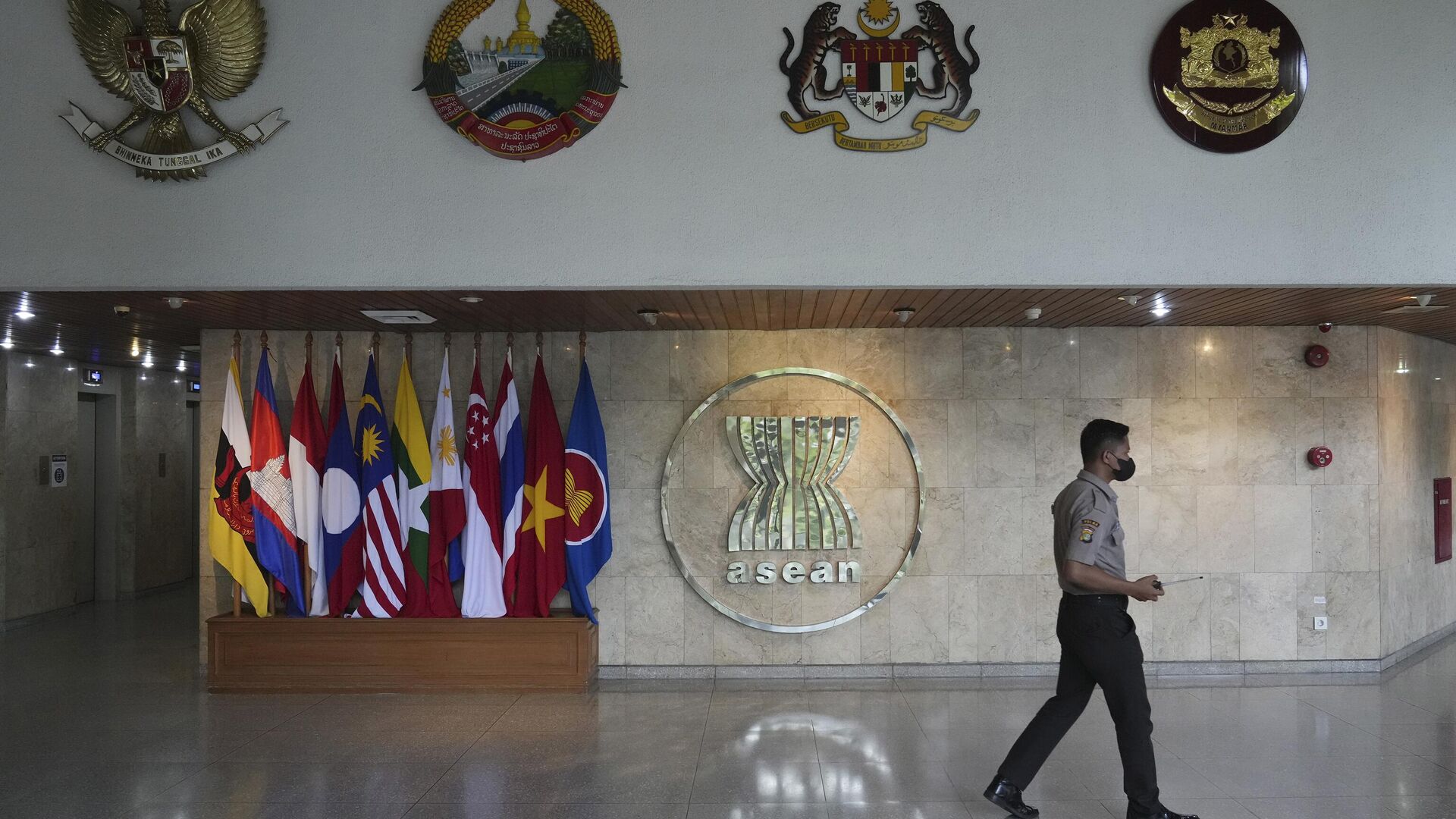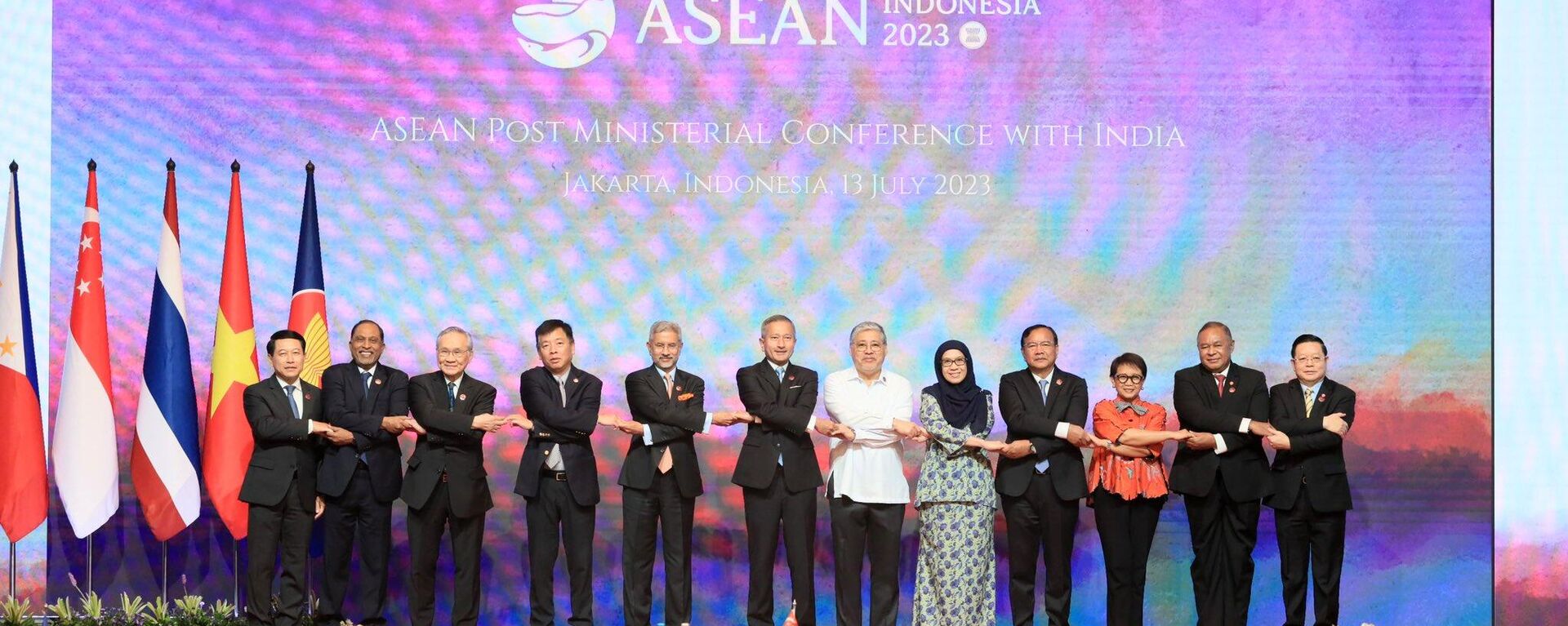https://sputniknews.in/20230907/asean-maintains-inclusive-approach-toward-russia-expert-4106324.html
ASEAN Maintains Inclusive Approach Toward Russia: Expert
ASEAN Maintains Inclusive Approach Toward Russia: Expert
Sputnik India
The ten-member Association of Southeast Nations (ASEAN) has continued to maintain its “inclusive approach” towards all its external partners, including Russia, a Manila-based geopolitical analyst has told Sputnik.
2023-09-07T20:54+0530
2023-09-07T20:54+0530
2023-09-07T20:54+0530
sputnik opinion
sergey lavrov
russia
china
asean
g7
aukus
nato
indo-pacific
indian ocean
https://cdn1.img.sputniknews.in/img/07e7/06/13/2556599_0:160:3072:1888_1920x0_80_0_0_ac1b17598047c53e1f5539ebe49a8ded.jpg
The ten-member Association of Southeast Nations (ASEAN) has continued to maintain its inclusive approach towards all its external partners, including Russia, a Manila-based geopolitical analyst has told Sputnik India.Gill’s remarks come as the southeast Asian nations concluded the 43rd ASEAN Summit in Jakarta on Thursday.The southeast Asian bloc also held separate summits with several of its dialogue partners, including China, India, Japan, South Korea and Canada, on the margins of the ASEAN Summit.The East Asia Summit (EAS), which brings together ASEAN states and its eight partners—Australia, China, India, Japan, New Zealand, Russia, South Korea and the US—took place on Thursday.Existing Energy Cooperation Between Russia and southeast AsiaMajor southeast Asian economies, including Malaysia and Singapore, have reportedly continued their purchases of Russian oil in 2023.Additionally, Philippines’ President Ferdinand Marcos Jr. has also indicated that he is open to source crude from Moscow in a bid to tackle domestic inflation which has plagued all southeast Asian economies due to Covid and the spillover effects of Ukraine conflict.The collective west's global push to try and deprive Russia of its energy and commodity revenues in the wake of the special military operation in Ukraine has adversely affected global supply chains, in turn affecting the developing countries the most.The G7 club and Australia announced a ‘price cap’ of $60 per barrel on Russian oil exports last December, threatening third nations that those flouting the so-called cap won't be allowed to use western insurance and shipping services.However, reports indicate that the cap has failed to meet its objectives and the Russian oil has been selling at over the $60 per barrel mark, with China and India replacing the EU as top recipients of Russian exports.Besides, global crude prices have also witnessed an increase after a deal between Russia and Saudi Arabia to cut the global crude output to stabilize prices.Growing Food Security in Southeast AsiaThe southeast Asian leaders have announced in the joint declaration that they would intensify efforts to bolster the regional food security and supply chains, according to official documents.Besides adopting the ‘ASEAN Leaders’ Declaration on Strengthening Food Security and Nutrition in Response to Crises’ document, the southeast Asian countries also signed food security and agricultural cooperation pacts with Australia, Canada, China and India.Concerns Over Growing Geopolitical TensionsThe AOIP is premised on putting ASEAN at the centre of the emerging security architecture in Indo-Pacific, as well as respecting the UN Convention on the Law of the Sea (UNCLOS).The ASEAN member states have asked China to abide by UNCLOS in the South China Sea, where southeast Asian nations are involved in maritime dispute with China.At the same time, ASEAN has also expressed concern over the “declining commitment and cooperation in global non-proliferation” in the joint statement, urging all the countries to preserve the Southeast Asian region as a Nuclear Weapons-Free Zone (NWFZ).The call becomes relevant amid militarization concerns over the US-led AUKUS pact as well as NATO’s proposed engagement in Asia-Pacific to deal with the “systemic challenge” posed by China, as highlighted in the grouping’s ‘Strategic Concept’ published last year.
https://sputniknews.in/20230801/asean-releases-maiden-maritime-outlook-amid-changing-geostrategic-landscape-3312760.html
russia
china
asean
indo-pacific
indian ocean
pacific ocean
southeast asia
malaysia
singapore
south china sea
us
Sputnik India
feedback.hindi@sputniknews.com
+74956456601
MIA „Rossiya Segodnya“
2023
Dhairya Maheshwari
https://cdn1.img.sputniknews.in/img/07e6/0c/13/138962_0:0:641:640_100x100_80_0_0_2cb44360dbcdf6d84bf4b299cd045917.jpg
Dhairya Maheshwari
https://cdn1.img.sputniknews.in/img/07e6/0c/13/138962_0:0:641:640_100x100_80_0_0_2cb44360dbcdf6d84bf4b299cd045917.jpg
News
en_IN
Sputnik India
feedback.hindi@sputniknews.com
+74956456601
MIA „Rossiya Segodnya“
Sputnik India
feedback.hindi@sputniknews.com
+74956456601
MIA „Rossiya Segodnya“
Dhairya Maheshwari
https://cdn1.img.sputniknews.in/img/07e6/0c/13/138962_0:0:641:640_100x100_80_0_0_2cb44360dbcdf6d84bf4b299cd045917.jpg
asean summit, asean summit 2023, asean news, southeast asia news, russian oil exports, russian crude exports, g7 sanctions, russian oil price cap, russian food exports, food security, modi news, india news, india rice export ban, india rice ban, china news, china asean summit
asean summit, asean summit 2023, asean news, southeast asia news, russian oil exports, russian crude exports, g7 sanctions, russian oil price cap, russian food exports, food security, modi news, india news, india rice export ban, india rice ban, china news, china asean summit
ASEAN Maintains Inclusive Approach Toward Russia: Expert
Speaking at the East Asia Summit (EAS), Russian Foreign Minister Sergey Lavrov called for strengthening the multilateral architecture in ASEAN and ensure the "developmental pace" of the region.
The ten-member Association of Southeast Nations (ASEAN) has continued to maintain its inclusive approach towards all its external partners, including Russia, a Manila-based geopolitical analyst has told Sputnik India.
“While Russia is a major exporter (of energy), there are concerns (among some member countries) over potential repercussions of expanding energy ties due to the current trends in international geopolitics,” stated Don McLain Gill, the Director for South and Southeast Asia at the Philippine-Middle East Studies Association (PMESA).
Gill’s remarks come as the southeast Asian nations concluded the 43rd ASEAN Summit in Jakarta on Thursday.
The southeast Asian bloc also held separate summits with several of its dialogue partners, including China, India, Japan, South Korea and Canada, on the margins of the ASEAN Summit.
The East Asia Summit (EAS), which brings together ASEAN states and its eight partners—Australia, China, India, Japan, New Zealand, Russia, South Korea and the US—took place on Thursday.
Existing Energy Cooperation Between Russia and southeast Asia
Major southeast Asian economies, including Malaysia and Singapore, have reportedly continued their purchases of Russian oil in 2023.
Additionally, Philippines’ President Ferdinand Marcos Jr. has also indicated that he is open to source crude from Moscow in a bid to tackle domestic inflation which has plagued all southeast Asian economies due to Covid and the spillover effects of Ukraine conflict.
“Since the Covid-19 pandemic and the ongoing conflict in eastern Europe, energy and food insecurity has been increasingly problematic, particularly for net importing countries in Southeast Asia. This also comes at a time of high-level inflation and poverty rates,” Gill underscored.
The collective west's global push to try and deprive Russia of its energy and commodity revenues in the wake of the special military operation in Ukraine has adversely affected global supply chains, in turn affecting the developing countries the most.
The G7 club and Australia announced a ‘price cap’ of $60 per barrel on Russian oil exports last December, threatening third nations that those flouting the so-called cap won't be allowed to use western insurance and shipping services.
However, reports indicate that the
cap has failed to meet its objectives and the Russian oil has been selling at over the $60 per barrel mark, with
China and India replacing the EU as top recipients of
Russian exports.
Besides, global crude prices have also witnessed an increase after a deal between Russia and Saudi Arabia to cut the global crude output to stabilize prices.
Growing Food Security in Southeast Asia
The southeast Asian leaders have announced in the joint declaration that they would intensify efforts to bolster the regional food security and supply chains, according to official documents.
Besides adopting the ‘ASEAN Leaders’ Declaration on Strengthening Food Security and Nutrition in Response to Crises’ document, the southeast Asian countries also signed food security and agricultural cooperation pacts with Australia, Canada, China and India.
“It is in the interest of ASEAN to expand its commercial relations with major powers to broaden and diversify their agricultural imports and address the widening gap of food insecurity,” Gill remarked.
Concerns Over Growing Geopolitical Tensions
The ASEAN Joint Declaration expressed “concern over the intensifying geopolitical tensions in the region”, as it urged countries to follow the ASEAN Outlook on Indo-Pacific (AOIP) as the key vision document guiding their policies towards Indian and Pacific Oceans.
The AOIP is premised on putting ASEAN at the centre of the emerging security architecture in Indo-Pacific, as well as respecting the UN Convention on the Law of the Sea (UNCLOS).
The ASEAN member states have asked China to abide by UNCLOS in the South China Sea, where southeast Asian nations are
involved in maritime dispute with China.
At the same time, ASEAN has also expressed concern over the “declining commitment and cooperation in global non-proliferation” in the joint statement, urging all the countries to preserve the Southeast Asian region as a Nuclear Weapons-Free Zone (NWFZ).
The call becomes relevant amid militarization concerns over the US-led AUKUS pact as well as NATO’s proposed engagement in Asia-Pacific to deal with the “systemic challenge” posed by China, as highlighted in the grouping’s ‘Strategic Concept’ published last year.
Gill noted that ASEAN countries “remain wary of the intensifying US-China power competition” as they worry that they might have to eventually pick sides.
“Moreover, the selective engagement from by both powers towards the members of the bloc creates a perception of their lack of genuine intent to consistently engage with ASEAN on multilateral and inclusive terms,” the geopolitical analyst remarked.



